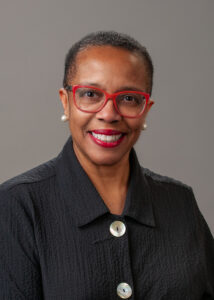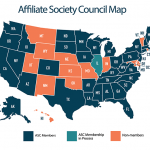“I’m a woman of many hats,” laughs Gwenesta B. Melton, MD, FACR, of Fayetteville, N.C., the newly appointed chair of the ACR’s Affiliate Society Council (ASC), as she describes her involvement with advocacy in rheumatology.

Dr. Melton
Indeed, since transitioning from her private clinical practice, Dr. Melton has kept a very full calendar. In early March, she had just returned from the Winnipeg meeting of the Canadian Rheumatology Association, where she represented the Association of Woman in Rheumatology (AWIR)—an organization she co-founded with Grace Wright, MD, and for which she serves as vice president. She is active in ACR advocacy at the state and federal levels and is a past president of the North Carolina Rheumatology Association (NCRA). She is also still on faculty with Campbell University School of Osteopathic Medicine, Lillington, N.C., where she teaches medical students and continues teaching advance practitioners about rheumatology.
Goals for the ASC
Dr. Melton’s involvement with the ASC reaches back more than a decade, dating to her past presidency of the NCRA. At that time, she was taken with the ASC mission to share best practices in funding and setup with state societies, helping physicians survive in the delivery environment. The pandemic slowed those initiatives down, she says. Her intentions for the next three years are to reenergize the council, “to make certain that it is strong and working in collaboration with the ACR, with the Coalition of State Rheumatology Organizations (CSRO) and with AWIR.” By fostering these active collaborations, it will be possible to amplify advocacy efforts, she believes.
The need for advocacy remains great, Dr. Melton points out, given the patchwork characteristics of state-specific policies and regulations that govern care delivery. Depending on the state, rheumatologists and their patients may be facing such barriers to care and payment as accumulation adjustment programs, rebate pass-throughs, step therapy prescriptions or limits on biosimilars.
“State societies need to be strong, because there is a lot of state-specific legislation that may affect the care of their patients,” Dr. Melton asserts. Whenever she talks with society leaders, she emphasizes the tangible benefits that alignment with the ASC brings. The ASC can play a valuable role in mentoring state societies, from beginning stages to ongoing projects, she says, and by furnishing resources on developing bylaws, guidance on avoiding conflicts of interest with pharmaceutical company support and the like.
Dr. Melton also notes that the ASC offers crucial benefits to community rheumatologists and wants to help strengthen the connection between the ASC and the ACR. She points out that one of the pillars of the ACR presidency of Deborah Dyett Desir, MD, is to help community-based rheumatologists. “Community-based rheumatologists tend to go to their state society meetings, so if ASC is seen as an ACR benefit, they might then reassess their relationship to the ACR,” Dr. Melton reasons.
Dedication to Giving Back
Dr. Melton graduated from Tulane University School of Medicine, New Orleans, and completed her internal medicine training at Brooke Army Medical Center at Fort Sam Houston, San Antonio, Texas. As part of the Army scholarship program, she and her husband, a nephrologist, completed a utilization tour in South Korea. She then did a rheumatology fellowship at Walter Reed Army Medical Center in Washington, D.C. Upon completion of her military obligation, she joined the Lafayette Clinic of Fayetteville, N.C.
Volunteering has been a strong through-line for her, with teaching and mentoring younger students as a vital part of that. “What’s fascinating to me is if you have been given much, you should be able to give back,” she says. Her love for the specialty motivates her continuing volunteerism with rheumatology.
Dr. Melton has other volunteering interests as well. She served on the board of the Lafayette Society, a community organization in Fayetteville, for 12 years and is currently president. She was initially piqued by the Marquis de Lafayette’s forward-thinking ideals, and volunteering with the society helps her continue giving to her community. “He was one of the first folks to talk to George Washington about abolishing slavery and granting equal opportunity for everyone—he had these amazing ideals that we are still striving to achieve,” she says.
A native of New Orleans, Dr. Melton is also helping the next generations achieve their potential by serving as a board member for KID smART, a New Orleans-based educational foundation that provides K-12 children access to high-quality arts education. Her leisure time is spent tracking walking tours of Europe, cruising on small ships, photographing structures and people or finding new dance moves. Family time is shared with her husband, a grown daughter, son-in-law and grandson.
Gretchen Henkel is a health and medical journalist based in California.

